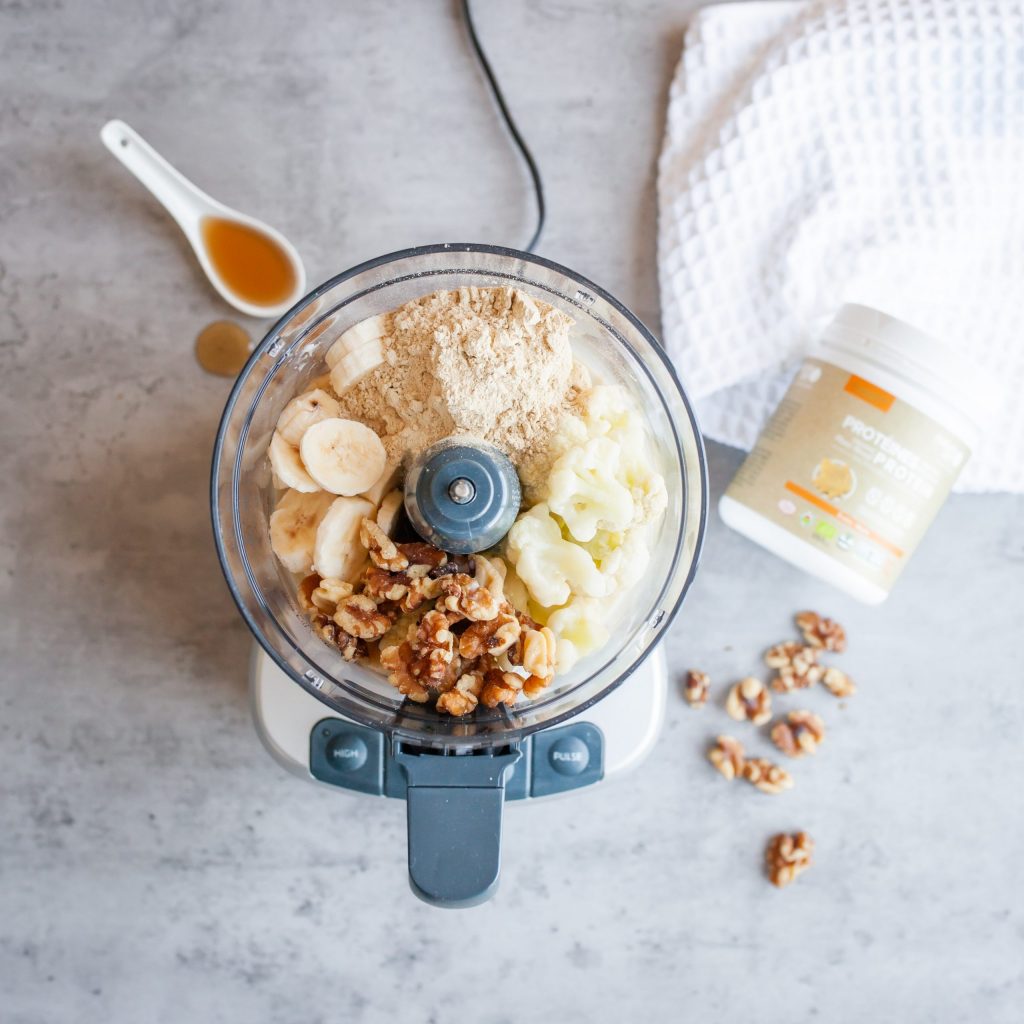Kate Smyth- Sports Naturopath and Nutritionist
It can be difficult to know how to choose the best protein powder. Protein plays a vital role in any athlete’s eating plan. Irrespective of your chosen sport be that running, triathlon, swimming, team sports, cycling or lifting weights, athletes expend more energy than the average person. Athletes also need more nutrients to recover from intense training or competition.
Protein provides both structural and functional properties to all working cells in the body, making up approximately one sixth of your body weight. Protein helps strengthen muscle tissue, repair damage and is critical to building muscle mass. Protein and amino acids are also vital for healthy bones, cartilage, tendons, skin and blood as explained in our article on collagen and tendons.
But there are many more benefits to including adequate protein in your diet, especially as an athlete. Optimising protein intake as an athlete is vital and needs can vary significantly from that of a more sedentary person.
Benefits of adequate protein
- Stable Blood Sugar – more energy and reduced fatigue
- Less Cravings for Sweet and Snack Foods- better weight management and reduced energy fluctuations
- Improved recovery after sessions and events
- Muscle growth and reduced risk of muscle loss, leading to greater powder to weight ratio
- Improved immune system, reduced downtime days and disruptions to training progress
- Healthy bone maintenance and reduced risk of osteoporosis
- Improved metabolism and fat burning capabilities- enabling of a lean physique
- Aids injury repair and improved recovery time
- Improved nerve function and muscle contraction
- Reduced hunger through reducing ghrelin (the hunger hormone) leading to greater satiety
Good sources of dietary protein
Ideally, sources of protein are coming from whole, fresh foods such as lean meat and poultry, fish, eggs, dairy products such as yoghurt, milk and cheese, seeds and nuts, beans, legumes, tofu and some grains, such as quinoa or buckwheat.
While it is possible for elite athletes to reach their daily protein requirements through diet from unprocessed wholefood sources (and this is highly recommended for the majority of protein intake) athletes in high training loads, with requirements for lean muscle mass or when injured, may find protein powders (20-30 grams) beneficial when ingested straight after training. During this time the muscles are more receptive to uptake of amino acids. However, muscle repair continues for 24 hours and therefore regular protein intake throughout the day is important.
Protein supplements such as whey protein or vegan protein powders are practical, convenient when travelling, or in a smoothie as a mid-morning snack.
Best protein powders
A ‘complete protein’ refers to the building blocks of protein – amino acids. There are 20 amino acids that can form a protein, and 9 that the body cannot produce on its own. These are the essential amino acids and we need to be able to get them through diet, or supplementation. All amino acids are required for protein synthesis, and a lack of one or more amino acids may compromise the athlete’s ability to build muscle.
Leucine is the key amino acid linked to muscle building and recovery. Research suggests ingestion of 2.7 grams of leucine results in a robust stimulation of muscle protein synthesis. Research suggests powders containing the optimal ratio for the branch chain amino acids leucine, isoleucine, and valine in a 2:1:1 ratio in addition to the full amino acid profile are optimal for sports recovery and performance.
What type of protein powder is best?
There isn’t one type of protein powder that is better than others however some powders may be more suited to athletes depending on food preferences and intolerances, and health goals. Powders with minimal ingredients, natural flavors, a balanced and complete amino acid profile, and organic are suggested to be the healthiest. Some powders may provide added probiotics beneficial for gut health.
Popular protein powder options include:
Plant-based protein
Plant-based protein powders may include combinations of pea, hemp, soy, pumpkin seed, flax seed fava bean, potato, corn and brown rice protein. Plant based options are dairy, whey, casein and egg free. Leucine, lysine, and/or methionine are key amino acids for muscle-building capacity which may be reduced in plant-based powders.
Plant-based proteins could provide the same amount of leucine by adjusting the amount of protein ingested. Due to the greater leucine content of corn, 20 g of protein needs to be ingested to provide 2.7 g leucine, while the dietary protein dose of the other plant-based proteins would need to be increased to 33 g (potato), 37 g (brown rice), 38 g (pea), 40 g (soy), and 54 g (hemp).
Plant-based proteins that do meet the requirements for essential amino acids include soy (27%), brown rice (28%), pea (30%), corn (32%), and potato (37%). When plant-based proteins are combined (e.g. rice and pea) the amino acid profile can be enhanced.
Microalgae has received considerable attention in recent years due to their high protein content (similar to meat, egg, soybean, and milk), presence of other beneficial nutrients, and production that requires less water and land than other crops or animal foods. 48 g of microalgae protein is required to provide 2.7 grams of leucine. Plant-based options are often viewed as sustainable, easily digestible, and potentially cheaper.
Whey
Whey protein powder is dairy-derived and fairly quickly and easily digested and absorbed. When combined with resistance training, whey protein may help increase muscle mass, support growth, and speed so it’s a great choice for athletes. Whey is also high in branched-chain amino acids (BCAAs), which can help speed muscle recovery.
Of the animal-based proteins, whey protein has the highest essential amino acid content of 43%. Whey protein is available in concentrate, isolate, or hydrolysate form, although many supplements contain a combination of the three. Typically 25g of whey protein provides 2.7 g of leucine.
Although whey concentrate and isolate offer similar benefits, whey protein isolate (WPI) undergoes processing methods that result in a higher concentration of protein and lower amounts of fat, carbs, and lactose. WPI may be a better option for those who are limiting their consumption of fat, carbs, or lactose. Hydrolyzed whey protein powders have been partially broken down to ease digestion and speed absorption.
Casein
Casein protein powders are dairy based and keep you feeling fuller for longer as they are digested and absorbed more slowly making them a good option for muscle growth and enhancing sleep when ingested before bed. Casein has a slightly lower essential amino acid content (34%) than whey (43%). Casein’s larger molecule size can make it more difficult to digest for some individuals and may be linked to digestive symptoms.
Egg
Egg white protein is suitable for those who have an allergy or intolerance to dairy products is paleo friendly and has a higher amino acid content (32%) than many of the plant-based proteins. It is not as easily manufactured and therefore not as widely distributed or found in health food shops. Egg white typically provides 26 grams of protein in a 30-gram serve.
Collagen
As mentioned in our blog, collagen is great for bone, joint, and ligament health, and a 20-gram serving of collagen peptides contains 18 grams of protein, no carbohydrates, and no fat. Collagen has a different amino acid profile to protein powders and therefore can be added to your protein powder or taken before a workout for tissue repair.
If you would like to know how we can best support your sports nutrition goals. Make an appointment here.
About the Author: Kate Smyth is a Sports naturopath, nutritionist and female centric running coach. She is the founder of the Athlete Sanctuary- a holistic healthcare clinic for athletes of all levels and sporting codes. Kate has a thirst for knowledge with two bachelor’s and a master’s degree under her belt. She has been involved in sports for many decades and competed for Australia in the Commonwealth Games and Olympic Games marathons with a personal best time of 2 hours 28 minutes. For more information visit www.athletesanctuary.com.au
References
Athletic requirements for protein intake, Australian Institute of Sport- https://www.ais.gov.au/ . While athlete’s requirements have been widely debated, the Australian Institute of Sports has published this fact sheet on the Athletic Requirements for Protein Intake.
Campbell, B., Kreider, R. B., Ziegenfuss, T., La Bounty, P., Roberts, M., Burke, D., … & Antonio, J. (2007). International Society of Sports Nutrition position stand: protein and exercise. Journal of the international society of sports nutrition, 4(1), 1-7.
Witard, O. C., Garthe, I., & Phillips, S. M. (2019). Dietary protein for training adaptation and body composition manipulation in track and field athletes. International Journal of Sport Nutrition and Exercise Metabolism, 29(2), 165-174.https://journals.humankinetics.com/view/journals/ijsnem/29/2/article-p165.xml
Vitale, K., & Getzin, A. (2019). Nutrition and supplement update for the endurance athlete: review and recommendations. Nutrients, 11(6), 1289.https://www.mdpi.com/2072-6643/11/6/1289/htm
Bleakley S, Hayes M. Algal proteins: extraction, application, and challenges concerning production. Foods. 2017;6(5):33. doi: 10.3390/foods6050033.



